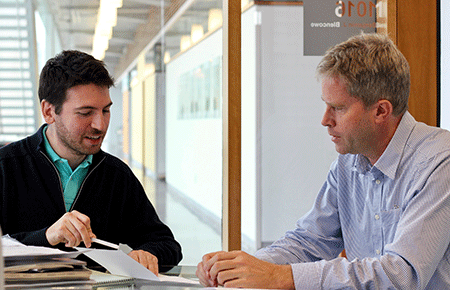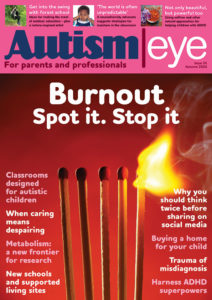Researchers have discovered a network of more than 200 genes linked to autism.
The findings are part of a research programme led by the University of Toronto’s Professor Benjamin Blencowe.

Researchers Thomas Gonatopoulos-Pournatzis (left) and Professor Benjamin Blencowe, whose work has identified more than 200 genes linked to autism
The scientist said the work has revealed how very short segments of genes with links to autism become spliced.
Network of 200 genes key to brain wiring and behaviour
The network of more 200 genes works to control the splicing.
That process diversifies protein molecules in the brain and other parts of the body.
Toronto scientists showed previously how when this process is disrupted it is closely linked to altered brain wiring and behaviour found in autism.
Potential to develop therapies
Researcher Thomas Gonatopoulos-Pournatzis led the study.
He said understanding how the gene segments become spliced means “you can potentially target it using rational approaches to develop therapies”.
Scientists have linked hundreds of genes to autism. This makes its genetic basis difficult to untangle.
Alternative splicing of small gene fragments, or microexons, has emerged as a unifying concept in the molecular basis of autism.
The concept emerged after scientists discovered the splicing had been disrupted in a large proportion of people with autism.
Microexons affect the ability of proteins to interact with each other during the formation of neural circuits in the brain.
They are especially critical because of the role they play in combining proteins during the splicing process.
Microexons perform a type of microsurgery on proteins to alter their function.
Dramatic effects from small changes
Even though microexons make small changes to proteins, the effects can be dramatic.
In people with autism, many microexons are weakly spliced. In part, this is because of reduced production of a protein called nSR100 that scientists suspect may be a factor in autism.
The researchers published their paper in the journal Molecular Cell.
Related:
- 18 new genes found with links to autism
- Risk linked to common genes
- Gene found linking seizures and autism
- Cancer drug may reverse genetic autism
- Gene find points to better treatment
- New test heralds early autism diagnosis
Published: 9 November 2018
















